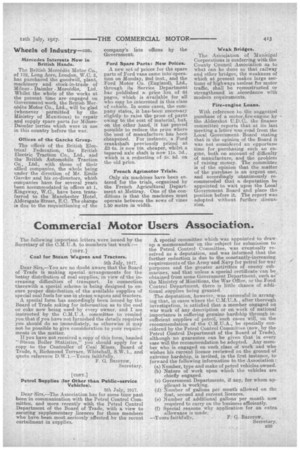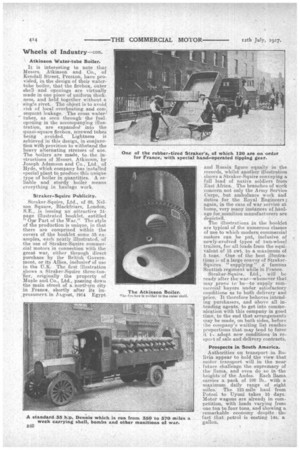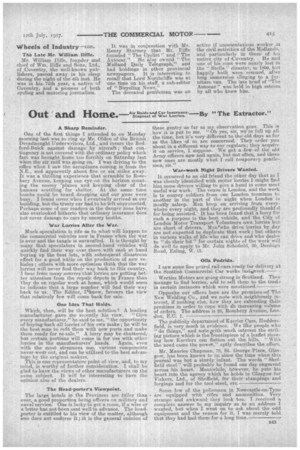Commercial Motor Users Association.
Page 9

Page 10

Page 11

If you've noticed an error in this article please click here to report it so we can fix it.
The .following important letters were issued by the Secretary of the C.M.U.A, to members last week :— • [ooPv.] Coal for Steam Wagons and Tractors.
5th July, 1917.
Dear Sirs,—You are no doubt aware that tile Board of Trade is making special arrangements for the better distribution of coal supplies, in view of the increasing difficulties of transport. In connection therewith a special scheme is being designed to ensure proper distribution of the available supplies of special coal fuels for use in steam wagons and tractors.
A special form has accordingly been issued by the Board of Trade asking for information as to the coal or coke now being used by every owner, and I am instructed by the C.M.U.A. • committee to remind , you that if you have not furnished the details required you should (10 so immediately, as otherwise it may not be possible to give consideration to your requirements in the matter.
If you have not received a copy of this form, headed " Steam Boiler Statistics," you should apply for a copy to the Controller of Coal Mines, Board of Trade, 8, Richmond Terrace, Whitehall, S.W. I., and quote reference D.W.1.—Yours faithfully.
F. G. Bassrow, Secretary.
[copy.] Petrol Supplies (for Other than Public-service Vehicles). 5th July, 1917.
Dear Sirs.—The Association has for some time past been in communication with the Petrol Control Committee, andmore recently with the Petrol Control Department of the Board of Trade, with a view to securing supplementary licences for those members who have been most seriously affected by the recent curtailment in supplies.
A special committee which was appointed to draw up a memorandum on the subject for submission to the Petrol ControlCommittee, was eventually received as a deputation, and was informed that the further reduction is due to the constantly-increasing requirements of the Army and Navy for petrol for war 'purposes and the greater activities of enemy submarines, and that unless a special certificate can be obtained from some Government Department, such as the Ministry of Munitions, the War Office, or the Food Control Department, there is little chance of additional supplies being granted. The deputation, however, was successful in arranging that, in cases where the C.M.U.A., after thorough investigation, is satisfied that a member engaged on war work of any description or on work of national importance is suffering genuine hardship through insufficient supplies of petrol, such cases will, •on the recommendation of the C.M.U.A., be specially considered by the Petrol Control Committee (now' by the Petrol Control Department of the Board of Trade), although no guarantee can be given that in every case will the recommendation be adopted. Any member who is engaged on such class of work and who wishes his current licence reviewed on the ground of extreme hardship, is invited, in the first instance, to forward the following information to the Association:
(a) Number, type and snake of petrol vehicles owned. (b) Nature of work upon which the vehicles are chiefly engaged, (c) Government Departments, if any, for whom applicant is working. (d) Number of gallons per month allowed on the first, second and current licences. (e) Number of additional gallons per month now required to carry on the business efficiently. (0 Special reasons why application for an extra allowance is made.
—Yours faithfully, F. G. Baistow, Atkinson Water-tube Boiler.
It is interesting to note that Messrs. Atkinson and Co., of Kendall Street, Preston, have provided', in the design of their watertube boiler, that the firebox, Outer shell and openings are virtually made in one piece of uniform thickness, and held together without a single rivet. The object is to avoid risk of local overheating and con-; sequent leakage. The cross waters tubes, as seen through the fuelopening in the accompany-mg illustration, are expanded" into the quasi-square firebox, screwed tubes being avoided. Lightness is achieved in this design, in conjunction with provision to withstand the heavy alternating stresses of use. The . boilers are made, to the instructions of Messrs. Alkinson, by Joseph Adamson and Co., Ltd. of Hyde, which company has installed special plant to produce this unique type of boiler in quantities,. A reliable and sturdy boiler means everything in haulage work.
Straker-Squire Publicity.
Straker-Squire, Ltd., of 68, Nelson Square, Blackfriars; London, SE., is issuing an attractive 24page illustrated booklet, entitled "Our Part of the War." The style of the production is unique, in that there are comprised within the covers of the booklet some 35 examples, each neatly illustrated, of the use of Straker-Squire commercial motors in connection with the great war, either through direct purchase by the British Government, or its Allies, inclusive of use in the U.K. The first illustration shows a Straker-Squire three-tonfier, originally the property of Maple and. Co., Ltd., passing down the -main street of a northern city in France, shortly after its im,pressment_ in hugest, i914 Egypt
and Ruasia, figure equally in 'the records, whilst another illustration shows a Straker-Squire conveying a full load of native soldiers from East Africa. The branches of Work concern not only the Army Service Corps, but ambulance work and duties for the Royal Engineers ; again; in the case of war service at home, very many instances of haulage for munition manufacturers are depicted.
The illustrations in the booklet are typical of the numerous classes of use to which modern commercial motors can be put, inclusive, of newly-evolved types of two-wheel trailers, for all loads from the equi:valent of 15 cwt. to a maximum of Ei tons. One of the best illustrations is of a large convoy of StrakerSqu ires. " supplying" a famous Scottish regiment While in France.
Straker-Squire, Ltd., will be ready after the war—whenever that • may prove to be—to supply commercial buyers under satisfactory conditions as to both delivery and price. It therefore behoves intending, purchasers, and above all intending agents, to get into comtaunieation with this company in good time, to the end that arrangements may be made, on both sides, before the company's waiting list reaches proportions that 'may tend to force it t, adopt . new conditions in respect of sale and delivery contracts.
Prospects in South America.
Authorities on transport in Bolivia appear to hold the view • that motor transport will in the near future challenge the supremacy of the' llama,. and even de so in the heights' of the Andes. Each llama carries a, pack of 100 lb., with a maximum daily range of eight miles. The 125 mile haul from Potosi to Uyuni takes 15 days. Motor wagons are already. in competition, with loads varying from one ton to four tons, and showing a remarkable economy despite . the fact 'that, petrol is costing 14s. a gallon. The Late Mr. William Hine.
Mr. William Iliffe, founder and chief of Wm. Iliffe and Sons, Ltd., of Coventry, the well-known publishers, passed away in his sleep during the night of the 4th inst. He was in his 74th year, a native of Coventry, and a pioneer of both cycling and motoring journalism. It was in conjunction with Mr. Henry Stiirmey that Mr. Iliffe fotinded "The Cyclist" and "The Autocax." He also owned "The Midland Daily Telegraph," and had holdings in other provincial newspapers. It is interesting to recall that Lord Northcliffe was at one time on his staff, a sub-editor of "Bicycling News." The deceased gentleman was an
active if unostentatious worker in the civil activities of the Midlands, and particularly in those of h;s native city of "Coventry. He and one of his sons were nearly lost 'in the " Stella " disaster, in 1899, but happily both were rescued, after long immersion clinging to a furniture van. The late head of "The Autoear " was held in high esteem by all who knew him.






















